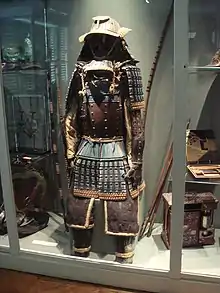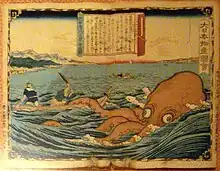Charles de Chassiron
Baron Charles Gustave Martin de Chassiron (1818-1871) was a French diplomat of the 19th century. He travelled to China and Japan as one of the two Attachés of the French Embassy under Baron Gros, with the title of "Detaché extraordinaire en Chine et au Japon" from 1858 to 1860,[1] together with Marquis Alfred de Moges.



Chassiron wrote an account of his travels Notes sur le Japon, la Chine et l'Inde: 1858-1859-1860.[2][3]


During his travels, Chassiron built a large collection of Japanese and Chinese artifacts which are displayed today at the Orbigny-Bernon Museum in La Rochelle.
The Chassiron lighthouse (Phare de Chassiron) at the northern tip of Ile d'Oléron was named after him.
He was the first husband of Princess Caroline Laetitia Murat (firstborn of Prince Napoleon Lucien Charles Murat, son of Caroline Bonaparte): they got married in Paris, 6 June 1850. They had a son, Guy de Chassiron (1863-1932). After his death his widow remarried that same year with a wealthy Englishman, John Lewis Garden, and had two daughters from him.
He was the father of famous dancer Emma Livry
Works
Notes
- The New Monthly Magazine, p.200
- Notes sur le Japon, la Chine et l'Inde by Charles de Chassiron
- French policy towards the Bakufu and Meiji Japan 1854-95 by Richard Sims p.306 Notes 46